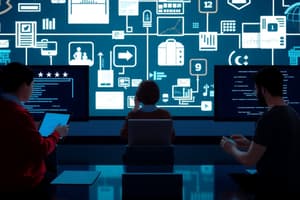Podcast
Questions and Answers
What does the term 'digital footprint' refer to?
What does the term 'digital footprint' refer to?
- Personal online reputation and privacy resulting from online activities. (correct)
- The speed at which information travels across the internet.
- A method for securing personal data across various platforms.
- The total amount of digital content consumed by a user.
Which of the following is a key aspect of evaluating information sources?
Which of the following is a key aspect of evaluating information sources?
- Determining the publication date.
- Summarizing the information provided.
- Choosing sources that are visually appealing.
- Assessing the credibility and reliability of the source. (correct)
What is one major challenge associated with information overload?
What is one major challenge associated with information overload?
- An increase in physical book sales.
- The ability to curate favorite sources easily.
- Improvements in communication technology.
- The difficulty in discerning fact from fiction. (correct)
What ethical consideration must be taken into account when sharing information online?
What ethical consideration must be taken into account when sharing information online?
What is the primary goal of developing media literacy skills?
What is the primary goal of developing media literacy skills?
What is essential for making informed decisions?
What is essential for making informed decisions?
What does responsible use of media and information encompass?
What does responsible use of media and information encompass?
What distinguishes competent production of media?
What distinguishes competent production of media?
Which of the following is a key aspect of media literacy?
Which of the following is a key aspect of media literacy?
What should individuals be aware of regarding their digital presence?
What should individuals be aware of regarding their digital presence?
Flashcards are hidden until you start studying
Study Notes
Navigating the Digital World Responsibly
- Information overload complicates distinguishing fact from fiction in the digital landscape.
- Every online action contributes to a digital footprint, affecting personal reputation and privacy.
- Cybersecurity threats, including phishing, malware, and data breaches, pose significant risks to users.
- Ethical use of media includes adhering to copyright law, avoiding plagiarism, and promoting responsible sharing.
Media and Information Literacy
- Access: Ability to find and gather relevant information from diverse sources.
- Analyze: Breakdown of media messages to reveal their intent, techniques, and biases.
- Evaluate: Assessment of the credibility and accuracy of various information sources.
- Create: Production of original media while following ethical standards.
Importance of Media Literacy
- Critical Thinking: Enhances skills to critically evaluate information, leading to informed decisions.
- Digital Citizenship: Encourages responsible online behaviors and fosters inclusive digital environments.
- Informed Decisions: Empower individuals to make choices based on reliable information, combating misinformation.
- Empowerment: Encourages active participation in content creation and ethical information sharing.
Responsible Use of Media and Information
- Fact-Checking: Verification of facts through multiple reliable sources and cautious approach to sensational headlines.
- Privacy and Security: Importance of managing the digital footprint and protecting sensitive personal information.
- Ethical Consumption: Respect for intellectual property rights, promoting responsible sharing of content.
Competent Production of Media and Information
- Quality Content: Focus on producing accurate and relevant information while avoiding bias and misinformation.
- Technical Skills: Development of skills in media creation using appropriate tools and software.
- Creativity and Innovation: Encouragement to explore diverse media formats and storytelling methods.
Balancing Responsible Use and Competent Production
- Emphasis on critical thinking to assess information and ensure ethical media creation.
- Importance of respecting copyright and privacy in all media interactions.
- Innovation and creativity should drive the development of engaging and informative media.
Media Literacy for a Better Future
- Embracing media literacy empowers individuals to navigate digital challenges and create meaningful content.
- Media literacy is a continuous process requiring lifelong learning and adaptation to changing information landscapes.
Studying That Suits You
Use AI to generate personalized quizzes and flashcards to suit your learning preferences.




